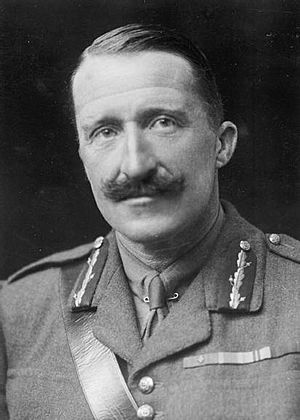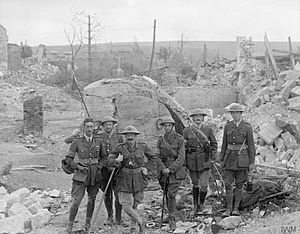John Vaughan Campbell facts for kids
Quick facts for kids
John Vaughan Campbell
|
|
|---|---|

Brigadier General John Campbell, c.1917–18
|
|
| Born | 31 October 1876 London, England |
| Died | 21 May 1944 (aged 67) Woodchester, Gloucestershire, England |
| Allegiance | United Kingdom |
| Service/ |
British Army |
| Years of service | 1896–1933 1939–1944 |
| Rank | Brigadier-General |
| Unit | Coldstream Guards |
| Commands held | 8th Battalion Gloucestershire Home Guard 3rd Battalion, Coldstream Guards |
| Battles/wars | Second Boer War First World War Second World War |
| Awards | Victoria Cross Companion of the Order of St Michael and St George Distinguished Service Order Mentioned in Despatches Officer of the Legion of Honour (France) Croix de guerre (France) |
Brigadier General John Vaughan Campbell (31 October 1876 – 21 May 1944) was a brave British Army officer. He received the Victoria Cross, which is the highest award for bravery in battle. This award is given to soldiers from Britain and Commonwealth countries.
Contents
Early Life and Military Start
John Vaughan Campbell was born in London, England. His father, Ronald George Elidor Campbell, was also an army captain. Sadly, his father died in the Zulu War in 1879.
John went to school at Eton College. Then he trained to be an officer at the Royal Military College, Sandhurst. In 1896, he joined the Coldstream Guards, a famous British Army regiment. He fought in the Second Boer War in South Africa. For his actions there, he received the Distinguished Service Order. He was also mentioned in official reports twice for his bravery.
Heroism in World War I
During the First World War, John Campbell was 39 years old. He was a temporary lieutenant colonel leading the 3rd Battalion of the Coldstream Guards. He earned the Victoria Cross for his amazing bravery on 15 September 1916.
The Battle of Ginchy
This brave act happened at Ginchy, France, during the Battle of the Somme. The first two groups of his soldiers were badly hit by enemy machine-gun fire. Lieutenant Colonel Campbell personally took charge of the third group. He gathered his men and led them forward against the enemy machine guns. They captured the guns and defeated the enemy soldiers.
Later that day, he again brought together the remaining soldiers of his battalion. He led them through very heavy enemy fire. His personal courage and quick thinking at a very important moment helped his division. Because of him, they were able to push forward and capture important targets.
The "Tally-Ho VC"
Something special happened that day, which wasn't in his official award report. But it was widely talked about in the news. John Campbell was called the "Tally-Ho VC." This is because he rallied his men under fire by blowing a hunting horn. He also used a traditional hunting cry, "Tally-Ho!"
Later in 1916, he was promoted to the rank of brigadier general.
Life After the War

In 1919, John Campbell became an aide-de-camp to King George V. This was a special role where he helped the King. He held this job until he retired from the army in 1933. After that, he was a member of the Honourable Corps of Gentlemen at Arms. This is a group of senior officers who act as the Sovereign's bodyguard.
Service in World War II
When the Second World War began, he continued to serve his country. From 1939 to 1940, he was an honorary flight lieutenant in the Royal Air Force Volunteer Reserve. Then, from 1941 until his death, he commanded the 8th Battalion Gloucestershire Home Guard. The Home Guard was a defense organization made up of volunteers.
John Vaughan Campbell passed away on 21 May 1944, at the age of 67. He died at his home in Woodchester, near Stroud. His Victoria Cross medal is now on display at The Guards Regimental Headquarters in Wellington Barracks, London.
 | Precious Adams |
 | Lauren Anderson |
 | Janet Collins |

